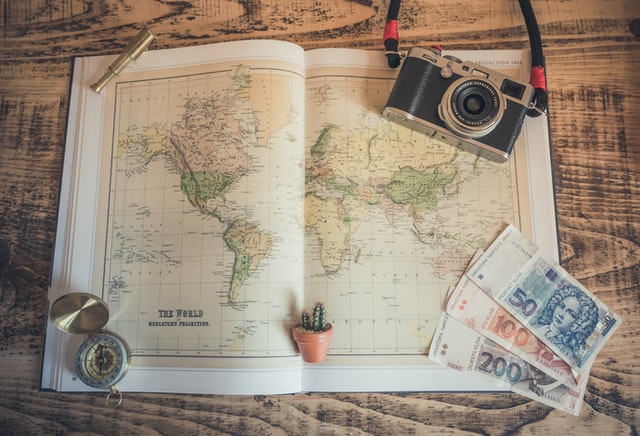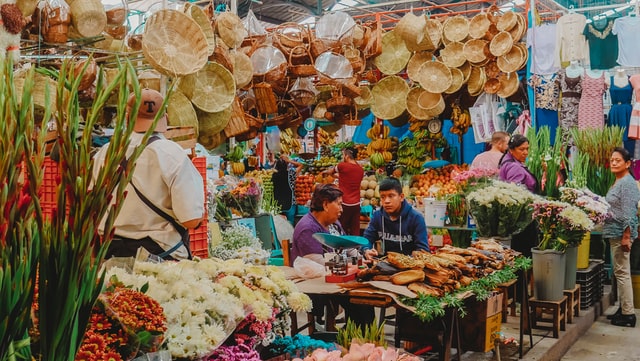Maybe all those months of downtime have finally convinced you there’s no better time than now. Or maybe you’ve finally saved enough for that first international trip on your bucket list. Whatever the reason you’re ready to start planning your first international trip. Here are your top questions answered before you take off down the run way.
Some of the links in this post are affiliate links. This means if you click on the link and purchase the item, we will receive an affiliate commission at no extra cost to you. All opinions remain our own.
Table of Contents
How far in advance should you plan international travel?

We are all for last minute impromptu travel deals! But you are truly doing yourself a favor if you plan at least one year out. International trips can take a chunk out of your budget. So even if you only have a foggy dream in your head of adventurous destinations, you can still start setting aside money. Starting a travel budget and researching different countries can happen long before flight deals come across your radar. Using a site like budgetyourtrip.com can help you calculate potential costs for each of the countries you’d like to see.
Research flights using free online tools such as Google Flights, paid subscription services like Going (previously known as Scott’s Cheap Flights) or an app like Hopper that can look at flights and hotels together and predict the best time to buy. You can get a sense of what the average cost is for when you’d like to travel and then be ready to snap up a deal when your alert comes in. If you are open to the unknown you can sign up for travel deal alerts and let the cheapest price determine your next adventure location. Often times the deal will cover flight dates that span multiple month’s long windows so you can pick dates that work best for you at the cheapest price.
Get Your Travel Goals Newsletter & BONUS Workbook
What are some things you should learn before traveling to another country?

Learn about the best and cheapest way to get money during your first trip. Airport exchange rates often do not benefit the customer so check the exchange rate at your bank to possibly get a small amount to carry with you. This can help you kick off your trip comfortably until you can get to an ATM.
Usually local ATMs will have the best exchange rates. Check with your bank for international ATM availability or charges that may be incurred should you use another ATM. See what fees are charged. Use cash or debit when you can. If you must use plastic, a debit card is going to help you avoid the additional international fees that credit cards can send to users.
Learn more about your cell phone data plan. Confirm ahead of time that you will have an international data plan or price the cost of an upgrade. This allows you to determine if you need to pick up a wi-fi hotspot or not before you leave for your trip.
Get Your Travel Goals Newsletter & BONUS Workbook
Learn a few basic expressions in the language of your new country. Showing an effort to communicate with others in their home language is a gracious way to connect. Trying out simple phrases such as “thank you” “good morning/evening” is an easy way to start. For the more adventurous, learn how to ask a local for a restaurant recommendation. You may even want to learn a few basic phrases that can help when things don’t go as planned such as learning how to ask for directions. This is something the whole family can practice together.
How to best prepare for your first international trip?

So you’ve got your tickets! You’re ready to focus in on your destination. Book a place to stay that includes a kitchen. You can spend too much of your time and a significant amount of your travel budget by constantly eating out in restaurants. And even eating at the best can be too much when staying more than 2 – 3 days. You and your family will want a home-cooked meal or you’ll want to feed a craving for something you are missing from home. Staying at a local home, a hotel suite with kitchen amenities, or even a hostel with a shared kitchen gives you and your family the ability to save some money to put toward better experiences. Taking the time to shop at a local market can not only be healthier, but it gives you the added bonus of a deeper dive into the daily lives of the community.

Book your day trips in advance. This is definitely not the place to wait for last minute deals. Train, ferry and bus tickets can often be much cheaper when booked farther out. One of the great benefits of international travel is the ability to use your base as a jumping off point to other outlying areas. Check in with the whole family about what they would like to see. You can engage your tweens and teens with this part of the trip by asking them which places they would prioritize seeing. Put those on the list as well. The city where you land can be just the start of your trip as high speed trains and well developed ferry or bus systems may offer opportunities to easily see more of your new country. The bus and train systems at your base location may offer a full daily schedule of easy day trips to other cities.
Get Your Travel Goals Newsletter & BONUS Workbook
Plan for trips to other places you’d like to see by checking online services for train and bus tickets. You can purchase these months in advance and save a lot of cash by doing it this way. As someone who has felt the pain of standing in front of a train station ticket kiosk gut kicked by the price gouging, trust me to say this is not what I wish for you. Online ticket services provide schedules built around a 24-hour clock in order to help avoid confusion, can be translated to English, and are usually straightforward to use.

Museums and cultural sites all have different hours and days of operation. You’ll need to do your research on which places are open and when so you can create a schedule that doesn’t leave you surprised standing with your family in front of a closed building. Most major cities have a City Pass style card that can be purchased in advance which gives you access to multiple locations for a flat fee. These passes can also offer skip the line privileges which save you time and money so be sure to review what perks come with each pass. Children often can get into museums for free so be sure to research costs of entry for each age group in your tribe. You may not need to buy a pass for each person.
How do you prepare your (teens’) body for international travel?

The short answer to this question – you can’t. Jet lag is real. Traveling abroad comes with long-haul flights for many of us and the inevitable change in time zones. You’ve heard the advice that you should skip all adult beverages on your flight (easy enough for the kids but I’m sure you’re not in a rush to do that). Drink tons of water (now you just have to use the nasty airplane bathroom more). Or you can try to adjust your sleep schedule gradually a few days in advance of your trip. But if you are like us that is just not possible. You’re still working and kids are going to school right up to the last minute. You don’t have the luxury of stopping your current world to adjust to future time zones. Let’s be honest – we don’t even manage to do that for daylight savings time!
Instead, help yourself tackle jet lag through your planning. You can’t avoid it but you can be ready for it. How you plan your time during your trip is the best way to help you and your tribe recover from the significant time difference.
Get Your Travel Goals Newsletter & BONUS Workbook
Trust me when I say do less to enjoy more. And my friend, I have learned the hard way. On our 8-day trip to Italy, I didn’t give us a second of downtime. We went from thing to thing to thing. The energy is there at first – the excitement of a new place. The awe of seeing things you’ve only seen in books. But that can’t last forever and your body will stop with or without your permission.
I did not plan for that much-needed rest on our first international trip. As a result, Florence is barely a memory. It’s the place my oldest slept on the street, my youngest slept in a book store by the train station, we groaned our way through those last two museums, we missed our timed entry to the Duomo and my husband couldn’t even enjoy what I still to this day consider the best sandwich I’ve ever eaten from Come Dio Comanda because he was so wiped out from jet lag he couldn’t process my request to try it. Let me say that again dear reader. My husband, the wannabe chef, couldn’t eat. This is bad. Create an itinerary for your trip with the idea in mind that you need to purposefully schedule days with nothing to do.

But…
With all that being said, jet lag can be a good thing. At least in the beginning. I know. I know. Now I’ve confused you. I truly don’t mean to. There is a method to my madness so stay with me. Remember how I mentioned there is that energy at first? That energy of the new and as-of-yet unexplored? Your sleep schedule is off and the city is calling you. This is the good side of jet lag. And we encourage you to answer the call. Can’t sleep? Then get out into your city (where it is safe to do so) and enjoy the time to have the streets to yourself. The Trevi fountain will never be as deserted as it is at 3 A.M. Some of our best photos have happened when we couldn’t sleep. So take advantage and see the best of your new city when no one else is around. Just don’t treat this as if it will last. Your energy will drain and this may be something you can only take advantage of once. That’s ok. Use your best judgment. Give your family the downtime later in your schedule and you will be able to catch up on much-needed rest.
Get Your Travel Goals Newsletter & BONUS Workbook
How can you explore a location beyond the tourist traps?
Talk to a local any chance you get. Taxi drivers, tour guides, the local host of your Airbnb are all possible connections to the behind-the-scenes locations that locals enjoy. Reach out to ask about those high-quality non-touristy places that will help you truly get to know the area. Want to know the best place to eat in the local market? Ask someone who lives there, the person selling flowers, or candy, or fabric. These locals spend all day every day at the market and have probably got the true inside scoop on which food vendor is the best.
An important bonus is that your kiddos will see you trying the language. Showing that respectful attempt to connect in another language is a life skill that you’ll want to pass on. You’re trying out some of those phrases you learned earlier in your planning. Recognize that there is a vulnerability that occurs when you have complex thoughts in your mind that you don’t have the language to share. Being able to share that with your children builds empathy toward others who have the same struggles with English.
So dust off that passport and get out there into the world much more prepared with these travel tips and answers to all of your top questions. I wish you all the excitement and hope that comes with planning an international trip! If you’d like to bring the vacation to you while waiting for your plan to take off down the runway take a look at these internationally inspired staycation ideas:
Italy Themed Weekend Staycation
7 Steps to the Ultimate Mexico-Themed Staycation
Or if you are interested in more international adventures you can check out the following posts:
Your Ultimate Lisbon Itinerary
The Ideal Rome 3 Day Itinerary
